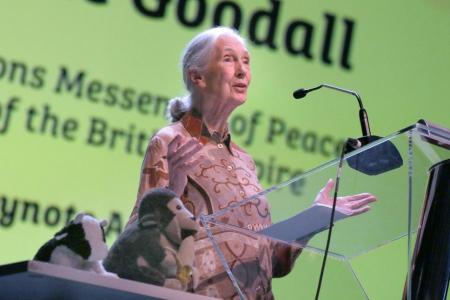Jane Goodall promotes nature conservation in Singapore
Celebrated primate researcher aims to nurture an inquisitive spirit in others
Famous primate researcher Jane Goodall once brought home earthworms as a child and was caught trying to take them to her room.
The incident highlighted the love for nature she had even as a young girl.
Today, at 83, the eminent conservationist travels all over the world hoping to share her passion.
Yesterday, Dr Goodall, who is in Singapore, spoke about the importance of nature conservation at an event to mark the 10th anniversary of the local chapter of the environmental group she founded, the Jane Goodall Institute (Singapore).
During her presentation, Dr Goodall shared the story of the earthworms.
Surprisingly, her mother was not angry, she said.
Over the years, her mother, Vanne, and mentor Louis Leakey helped nurture her inquisitive spirit.
It led to Dr Goodall going to Africa to study chimpanzees and discovering that nature conservation is a cause worth fighting for.
That inquisitive spirit is something Dr Goodall and her organisation want to mould in people all over the world through its various programmes.
For instance, the Singapore institute conducts bimonthly walks in places such as MacRitchie Reservoir Park and the Bukit Timah Nature Reserve to raise awareness about the primates in Singapore's forests.
There are no chimpanzees here, but the Republic has two native species of monkeys - the cheeky long-tailed macaque, and the elusive, critically endangered Raffles' banded langur.
Second Minister for National Development Desmond Lee, in his speech yesterday, said nature conservation does not come without challenges in tiny Singapore.
In this space, the Republic has to incorporate infrastructure that is required and consider people who may not be comfortable with wildlife, said Mr Lee.
But the key to nurturing a "biophilic city" - a city rich in biodiversity, in which its inhabitants can coexist - is education.
The National Parks Board and nature groups such as the Jane Goodall Institute (Singapore) conduct outreach activities such as free walks to help people learn more about the life thriving in Singapore's nature areas, said Mr Lee.
He said: "Singapore is a city in a garden and this is something we should be proud of and treasure. To succeed, our conservation approach needs to be different from bigger countries - proactively biophilic, community-based and grounded in science."
Get The New Paper on your phone with the free TNP app. Download from the Apple App Store or Google Play Store now


